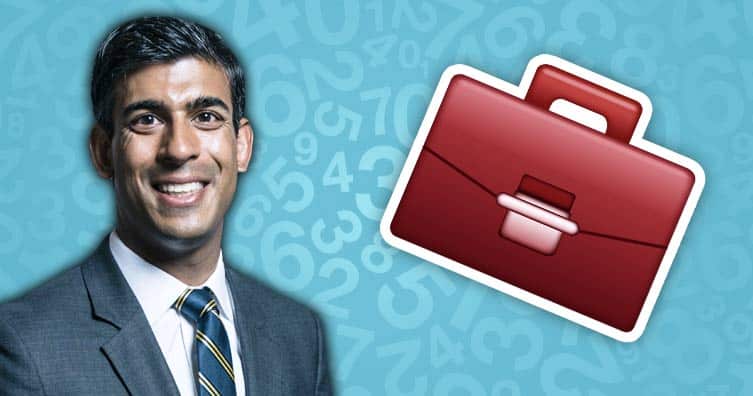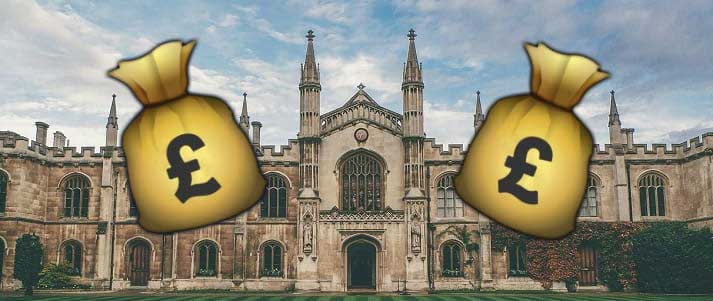After a year of economic turmoil, today saw what's been billed as one of the most important Budgets for a generation. Here's what it means for YOU.

Credit: james weston (background) – Shutterstock, james weston (background) – Chris McAndrew Wikimedia Commons
It's been a tough year for so, so many reasons, and alongside the devastating effect the coronavirus pandemic has had on our collective mental and physical wellbeing is the impact it's had on our finances.
While nobody has been able to escape the difficulties of the last 12 months, the consensus among the experts seems to be that young people will pay the greatest economic toll – be that through the loss of work now, or the lack of opportunities in the future.
But, with the light at the end of the COVID tunnel seemingly closer than ever, today's Budget was an opportunity for the government to outline how we can make it out in one piece and, hopefully, bounce back even stronger. So, did they deliver?
Budget 2021 explained
What is the Budget?

Credit: Cubankite – Shutterstock
The Budget is an annual event that sees the Chancellor provide the nation with an update on the country's finances, as well as announcing the government's plans for taxation and spending in the year ahead.
In 2020, the Budget took place as the coronavirus pandemic was beginning to take a grip on the UK, and the Chancellor, Rishi Sunak, promised billions of pounds to combat the virus.
However, within a couple of weeks, the country was in a full lockdown, and Sunak quickly had to announce a whole host of extra measures (including the furlough scheme) to see the country through the following months.
While we couldn't rule anything out, it seems as though (touch wood) things are heading in a better direction this time around. Hopefully, things won't take a significant change for the worse in the next few weeks and once again require what felt like a second Budget.
No extra support for students

It feels slightly odd to be starting a summary of the Budget with something that wasn't in it but, for students across the country, there was a glaring omission from the Chancellor's speech.
Despite calls from students, politicians and countless others, including all of us here at Save the Student, Rishi Sunak failed to announce any extra funding to support people at university who have been affected by the coronavirus pandemic.
As revealed by our recent National Student Accommodation Survey (NSAS), students have so far wasted an estimated £1 billion this year on accommodation that they've been unable to access due to lockdown restrictions.
While some may argue that this is money students would have spent on their accommodation either way, it's important to remember that the industries people usually work in while at university (like hospitality and retail) are also those that have been hardest hit by coronavirus.
Couple that with the thousands of parents who have been placed on furlough or lost work, and have therefore been unable to provide the financial contributions they have in the past, and it's clear that students are facing a perilous set of circumstances.
In fact, the most recent of our two surveys on the impact of COVID-19 on students found that almost half of those polled worry about money in relation to the pandemic. Among other things, some students are making up for this lost income with credit cards, gambling and sex work.
Now, the government did recently announce an extra £50 million of hardship funding for students in England. But, as NUS Vice President for Higher Education, Hillary Gyebi-Abadio, noted in our NSAS, if the government were to match the funding-per-student being made available in Wales, this amount offered would have to be more than £700 million.
Whether it's lockdown announcements or the promise of face-to-face teaching in this academic year, students have felt ignored and taken for granted throughout the pandemic – and today's announcement (or lack thereof) just feels like history repeating itself.
The minimum wage is going up

Credit: Paramount Pictures
It's fairly standard for the minimum wage to rise at the start of the new financial year (every April). Thanks to coronavirus, inflation rates in the UK are low, so the increase in the minimum wage is also pretty modest.
These figures had already been announced, but the Chancellor has today confirmed the following changes to the UK minimum wage, effective as of April 2021:
| Age | Current minimum hourly wage | New minimum hourly wage |
|---|---|---|
| 23+ (National Living Wage)* | £8.72 | £8.91 (+2.2%) |
| 21–22 | £8.20 | £8.36 (+2.0%) |
| 18–20 | £6.45 | £6.56 (+1.7%) |
| 16–17 | £4.55 | £4.62 (+1.5%) |
| Apprentice | £4.15 | £4.30 (+3.6%) |
* Before April 2021, the National Living Wage only covered those aged 25 and above.
Is this good news?
It's only a small increase, but any amount of extra money is still extra money – although, of course, it's tied to inflation, so really it's just helping you to cover the increased cost of living in the UK.
The extension of the National Living Wage to cover those aged 23 and 24 is also a welcome move, and offers some glimmer of hope to students and graduates facing one of the trickiest job markets for a generation.
And just a reminder that, whichever age bracket you fall into, it's always worth checking your payslip that your employer is respecting your employment rights and paying you accordingly









0 Comments:
Post a Comment